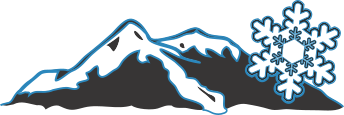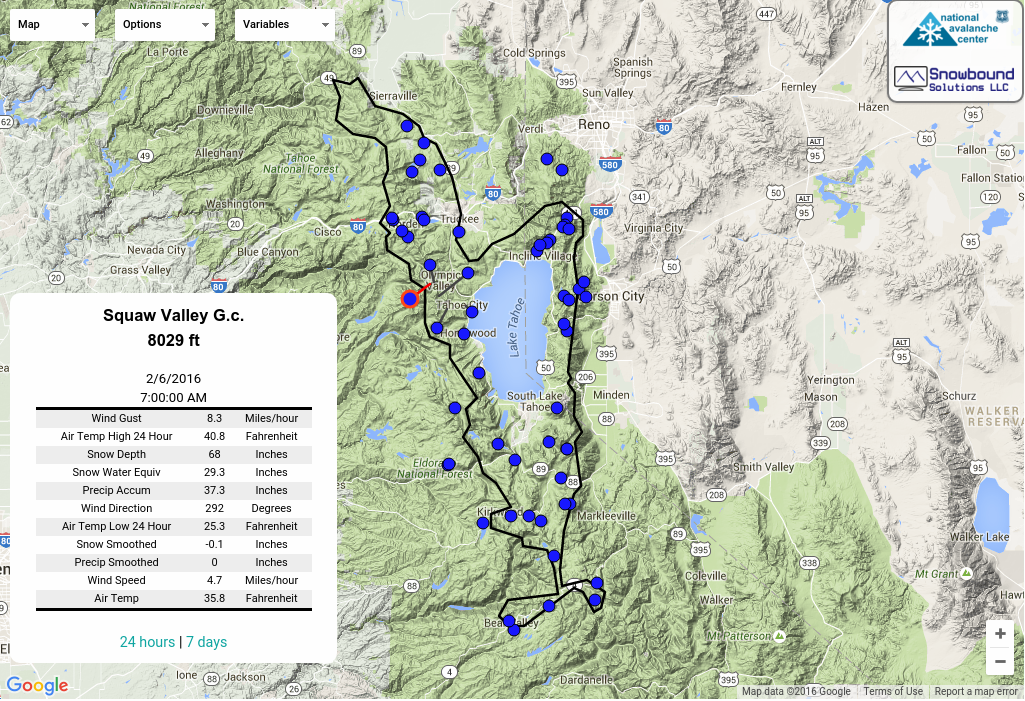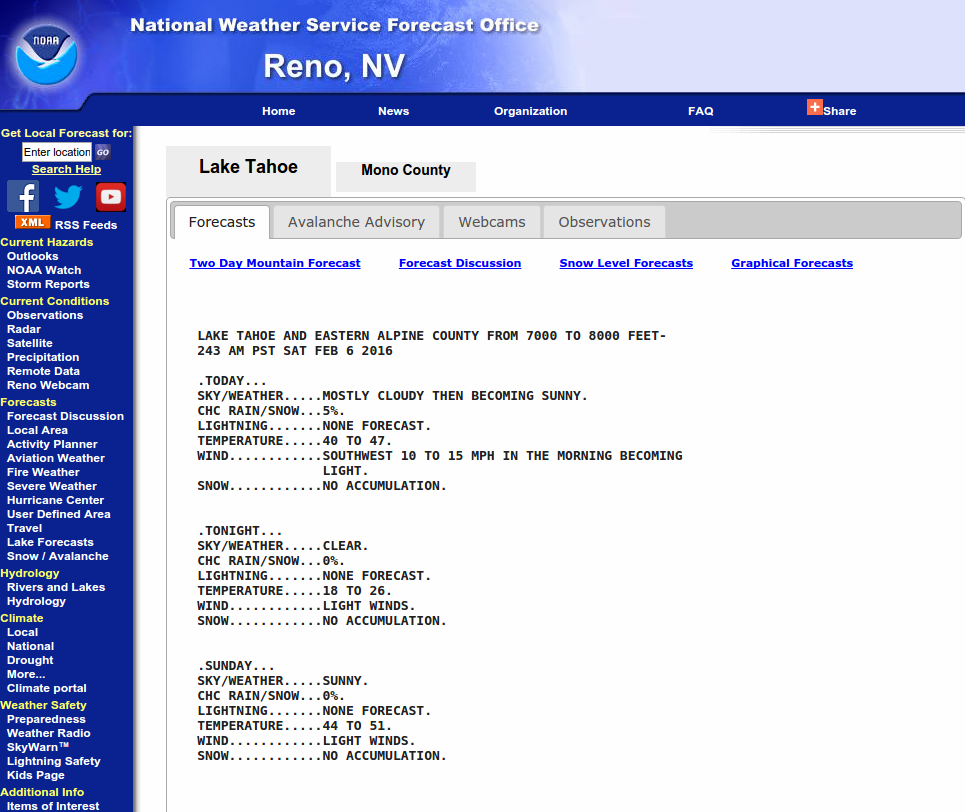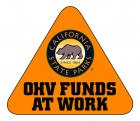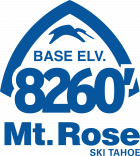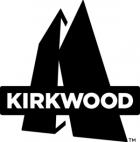
This Avalanche Advisory was published on November 24, 2011:

|
November 24, 2011 at 8:01 am |
|
For areas above 8,000 ft both above and below treeline, MODERATE avalanche danger exists on slopes 32 degrees and steeper on NW-N-NE-E aspects. The avalanche danger remains LOW in all other areas,. |
|
|
|
Forecast Discussion:
A low-pressure system affecting the forecast area has brought increased cloud cover and strong southwest winds. The precipitation associated with this system has moved either north or south of the area due to the system splitting as it approached the coast. A second weaker system expected to pass over the region later today and tonight should bring more of the same: clouds, wind and very little if any new snow. By tomorrow a high pressure ridge should start to form over the forecast area allowing drier, warmer, and clearer weather to return.
Yesterday on Castle Peak, snowpit tests showed that even though the Nov 18th facets had gained some strength, fractures remained possible in this layer. Skier-triggered whumpfs and shooting cracks common on slopes in this area 5 days ago, did not occur yesterday (snowpit, more info). Recent observations around the forecast area have revealed that this persistent weak layer remains weakest on N-NE aspects above 8000 ft. in below and above treeline terrain. Snowpack collapse with audible whumpfing, shooting cracks, and unstable snowpit test results have been common in these areas (pit profiles, videos, more info). Strong winds also continued to transport snow on Castle Peak yesterday. This wind loading continued to create and enlarge wind slabs in this area yesterday.
Avalanche Concern #1: Persistent slabs
The ingredients for avalanche activity still exist. The Nov 18 facet layer is still weak and the recent snow on top of it still represents a slab layer. This combination of a persistent weak layer with a slab on top of it will cause human-triggered avalanche activity to remain possible today. In some areas where the snowpack has this structure with less deep snow, anchors poking through the snowpack help prevent fractures in the weak layer from traveling very far. Of course, these same anchors also tend to damage skis, boards, snowmobiles, and people. The areas that hold a deeper snowpack and better recreation potential also hold the weakest snowpack. The N-NE aspects that had the most snow in Oct. and early Nov. represent these deeper and weaker slopes where the thickest and weakest facets exist under the largest slabs.
Avalanche Concern #2: Wind slabs
Strong southwest winds and unconsolidated snow on the surface have combined to create hard wind slabs in near and above treeline areas. Some human-triggered cracking and small test slope failures have occurred at the interface between the wind slabs and the lighter snow below them. In some areas where these slabs have formed, they have added further load to the Nov 18 facet layer. Due to the lack of snow on the windward aspects, less wind transport and wind slab formation should occur today. Expect the ongoing possibility of human triggered hard slab avalanches today in recently wind loaded areas near and above treeline on NW-N-NE-E aspects. The likelihood of this kind of instability should decrease as the wind ceases to transport snow either due to a lack of snow or a decrease in winds.
The bottom line:
For areas above 8,000 ft both above and below treeline, MODERATE avalanche danger exists on slopes 32 degrees and steeper on NW-N-NE-E aspects. The avalanche danger remains LOW in all other areas,.
Weather Observations from along the Sierra Crest between 8200 ft and 8800 ft:
| 0600 temperature: | 23 deg. F. |
| Max. temperature in the last 24 hours: | 35-38 deg. F. |
| Average wind direction during the last 24 hours: | Southwest |
| Average wind speed during the last 24 hours: | 50 mph |
| Maximum wind gust in the last 24 hours: | 101 mph |
| New snowfall in the last 24 hours: | O inches |
| Total snow depth: | 10-26 inches |
Two-Day Mountain Weather Forecast - Produced in partnership with the Reno NWS
For 7000-8000 ft: |
|||
| Thursday: | Thursday Night: | Friday: | |
| Weather: | Cloudy in morning becoming mostly cloudy with a 25% chance of isolated snow showers. | Mostly cloudy in the evening with clouds decreasing overnight. | Partly cloudy |
| Temperatures: | 34-42 deg. F. | 25-33 deg. F. | 41-47 deg. F. |
| Wind direction: | Southwest | Southwest | Southwest |
| Wind speed: | 10-15 mph with gust to 35 mph | 10-20 mph with gusts to 40 mph | around 10 mph with gusts to 30 mph becoming light in the afternoon |
| Expected snowfall: | trace in. | O in. | O in. |
For 8000-9000 ft: |
|||
| Thursday: | Thursday Night: | Friday: | |
| Weather: | Cloudy in morning becoming mostly cloudy with a 25% chance of isolated snow showers. | Mostly cloudy in the evening with clouds decreasing overnight. | Partly cloudy |
| Temperatures: | 30-35 deg. F. | 23-32 deg. F. | 36-43 deg. F. |
| Wind direction: | Southwest | West | West shifting to southwest |
| Wind speed: | 20-30 mph with gusts to 60 mph | 20-30 mph with gusts to 60 mph | 20-30 mph with gusts to 60 mph decreasing to 15-20 mph with gusts to 45 mph in the afternoon |
| Expected snowfall: | trace in. | O in. | O in. |
